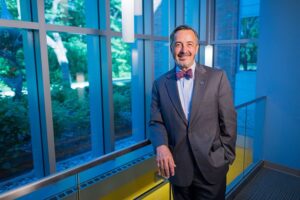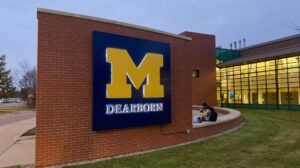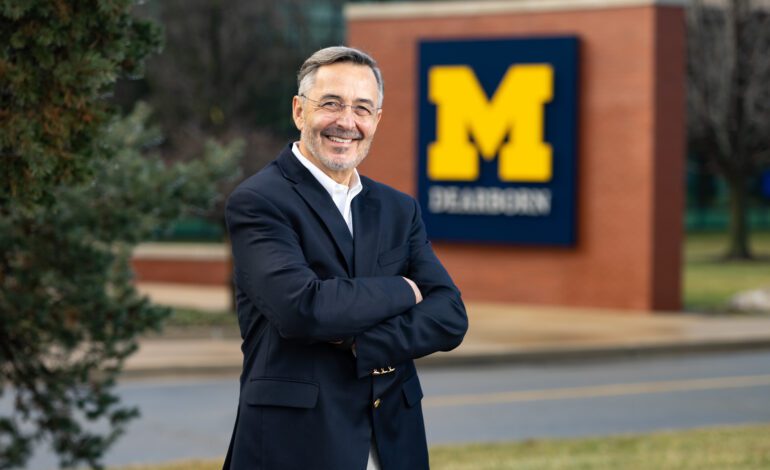On February 15, 2018, the University of Michigan-Dearborn announced the appointment of Domenico Grasso as a new chancellor after a meeting of the Board of Regents. Since the fall of that year, the sixth chancellor has been a very dynamic leader, making significant contributions to higher education, environmental research, diversity and inclusion, and community engagement. Coming from engineering to higher education Grasso served previously as provost at the University of Delaware; a vice president for research and dean of the college of engineering and mathematical sciences at the University of Vermont; the founding dean for engineering at Smith College and served also in the U.S. Army. Well known by the Dearborn community by his engagement to make the university a vibrant social component of our city, we met him to talk about the future, the past and of course how the present is shaped.
- Chancellor Grasso, as a decision maker, how do you see the future of the university and the city?
The university and the city of Dearborn have an extraordinary bright future; the city is on a steep upward trajectory. It is doing very well as a place of residence for very successful people and becoming a magnet for a diverse inclusive community and the campus is similar to that. We are very committed to students’ success; our ultimate goal is to attract students of promise and give them the tools and the opportunities to be successful in their careers and lives. What we’re doing is providing them with “practice based” education, which means not only giving them the theoretical foundation but also the practical experience. We also have many wraparound services to help them succeed. So I see the future as being very exciting for both the city and the university. And U of M-Dearborn, being part of a larger University of Michigan family, has a lot of resources, connections, and opportunities to take advantage of.
The university and the city of Dearborn have an extraordinary bright future; the city is on a steep upward trajectory. It is doing very well as a place of residence for very successful people and becoming a magnet for a diverse inclusive community and the campus is similar to that.
• Like you, a lot of your students are first-generation college students, so one of the biggest challenges they’re facing is balancing work and social obligation with academic achievement. What kind of steps is the university taking to accommodate them?
Another very good question. We’re trying to provide a lot of services to help students succeed, that’s our ultimate goal. As a matter of fact our graduation rate has increased by 8 percent in the last two years and that’s unheard of in terms of higher education, so we know that a lot of our initiatives are paying off.
One other thing that I started when I arrived here was “need first financial aid.” Although many schools focus on merit, all our students have been meritorious to enter the university. What we are focusing on is financial needs. We are trying to accommodate all their needs; we have a food pantry, clothes closet and many mental health services. We have many services to help our students balance their lives and be successful. And you’re right, almost half of our students are first generation. Almost an equal number are Pell-eligible students. So our students are different from many other universities, but they have enormous potential and drive and we’re here to help them succeed.

Chancellor Grasso
• Is it safe to say that the University of Michigan-Dearborn is providing the same level of education as the same university in Ann Arbor?
I would say that there is some difference between Ann Arbor and Dearborn. However, when our students go on the stage and receive a Michigan degree, I think they have the same potential and opportunities that our colleagues in Ann Arbor provide to their students. So they enter their university experience at different points, but what we hope to do is level the playing field by the time they graduate. So I think there is an enormous value added to a Dearborn degree.
• Why did you decide to go to education from engineering? Was there a special educator who influenced your schooling journey?
Well, after getting my PhD from U of M-Ann Arbor I became an engineering faculty member because I liked doing research and teaching. Later I was asked to fill certain administrative roles, for instance director of the environmental engineering program at the University of Connecticut, and then head of the department there. Then I had the opportunity at Columbia University, but turned it down to start an engineering program at Smith College. I was recruited to be dean at the University of Vermont, provost at Delaware and then chancellor here. One thing is certain, you can never predict the future; it just emerges and you have to capture the opportunities as they present themselves.
The slogan “Make America great again” is not very accurate because I don’t think we want to go back in time. There is an ancient Greek saying that you’re never going to step into the same river twice, so I think how we make America great, period and Michigan has a lot to offer in that regard.
• Do you see yourself as a Michigander? And what does Michigan have to offer — other than cars — to our country? And talking about cars, do you think it’s possible for the “Rust Belt” cities to “make America great again” by initiating the economic production? And is that what we need today or should we look for new economic models?
(Laughs) That’s a lot of questions. I married a Michigander, my wife grew up here. I did not grow up here, but I would like to think of myself certainly as a Michigander, and I don’t know how the word Michigander is used anyhow. For instance if you’re not born in Texas they don’t think you’ll ever be a Texan. Hopefully they accept me as a Michigander here, but I love the state of Michigan, it’s a wonderful place.
I think that the exciting part of being part of Michigan is not that the focus was on the auto industry, although that was the outcome; the focus was on the innovation and the creativity. And Henry Ford didn’t invent the car, but he innovated how to make the car affordable for the general mass through the assembly line. Michigan is about innovation, creativity, hard work and all the characteristics that have defined America over the last several centuries. The slogan “Make America great again” is not very accurate because I don’t think we want to go back in time. There is an ancient Greek saying that you’re never going to step into the same river twice, so I think how we make America great, period and Michigan has a lot to offer in that regard.

University of Michigan Dearborn
• Not far from your office is the mansion of Henry Ford, a man who changed Dearborn, America and the world by creating the affordable “Model T” car. If you have the chance to recall a historical figure to have dinner with, with whom would that be?
A very difficult question. There are so many people that have changed the world, so to speak. For instance, I don’t want to make anything religious about that, but it would be hard not to say I would have dinner with Jesus or Mohamed or the Buddha, for that matter. Or Confucius or Marcus Aurelius the emperor/philosopher, or Da Vinci. Or if I think of an alive person, Barack Obama.
(With emotion) If I had to pick one person, I would say I would like to have dinner with my mother again.
• The Roman Empire is looked at, until nowadays, as “the Empire”, and the United States has been the leader of the liberal world since the end of the Cold War. As an American from an Italian heritage do you draw some similarities between the two “Empires?” And what lessons of current significance could we pull out of the Roman history?
You know, neither the Roman Empire nor the American “Empire” is perfect. There was a Pax Romana and now we’re talking about Pax Americana, but that seems to be fleeting much quicker than the Pax Romana. I would say that the Roman Empire was created from force; they conquered and they acquired territories, but we have done it in a very different way, economically and through attempted sharing of democratic principles, so to speak. But of course we have stumbled upon the way on some of these decisions as well.
One of the things that the Romans did — and they did many things wrong — but one of the things I like that they did is that as they conquered territories they allowed people who were conquered to become Roman citizens and I think that created a cohesion and a sense of unity in the Roman empire; people felt a sense of ownership and that is not happening today. We have even so many divisions in our own country. Romans, in selecting their leaders, went after the best people and they were not necessarily geographically or culturally limited. For instance Trajan was from Hispania and Severus from Africa.

University of Michigan-Dearborn Chancellor Domenico Grasso
• We lived in recent years through a pandemic, a war at the Eastern gate of Europe and a complete economical uncertainty that families around the world have been facing. Do you think “the middle class” will become a dated term that we won’t be using anymore?
Well, the middle class is getting smaller and smaller, unfortunately, and now we’re not even referring to it almost as the middle class. Today, we’re talking about the working class, which in Karl Marx’s terminology was the proletariat, and I feel certainly and I am not alone thinking that there has been too much skewing toward the upper 1 percent or the upper 0.1 percent, which is untenable and I know that you had mentioned the term hegemony.
• Yes, that was my next question, actually. Antonio Gramsci talked about the “cultural hegemony” imposed by the dominant ruling class as an only view dictating the cultural norm. Do you think the rise of populism in the Western world is due to what people are considering a “betrayal” from the elite?
There is a gap between the working class and the elite for sure, and the whole concept that Gramsci was suggesting in the beginning of the 20th century has become a basis for the concept of the critical race theory. Cultural hegemony as a basis for structural racism has limited opportunities and that could be applied to race as well as socio-economic classes.
Also I think that there is a lack of trust, which is causing this increased populism. You could see why people are looking for change because that they feel that they have been betrayed by politicians and corporate leaders. Surprisingly, they seem to be supporting individuals who come from that mold to “right the ship.” Squeezing the middle class has certainly caused this rise of populism and they feel like they have been betrayed by the liberalism that according to Francis Fukuyama has been compromised on the left by identity politics and on the right by the new neo-liberal economic theories. Middle class is stuck in the middle of these and they see it’s collapsing all around.
U of M-Dearborn’s graduation rate has increased by 8 percent in the last two years and that’s unheard of in terms of higher education, so we know that a lot of our initiatives are paying off.

• So you mean the idea of dividing a social class into different communities is a result of this?
Well that’s the whole concept of identity politics. People tend to want to associate with their tribes and this caused this tension. We seem to no longer consider ourselves Americans first; we consider ourselves whatever sub group we are first and then Americans afterwards. I don’t know what the answer is to transcend this type of division and its barriers between us.
• What do you think about the higher education system and the crisis of students’ debt in the U.S.?
The higher education system in the U.S. is unique. They developed a system based on residential colleges to produce the well-rounded type of individual and in Germany they developed an intellectual research oriented system with very strong technical universities. Both were heavily subverted by the government.
The U.S. came along and in the 1800s developed a public service model of universities, the land-grant universities, to capitalize on the best of both systems. That is why the U.S. is considered the best higher education system in the world. At one time, we too were well supported by the government; there was strong public support for universities where the land grants schools were getting 80 percent of their operating budget from the state. Now we’re getting 8-10 percent from the state and we had to shift much of the burden to the students, while in the European countries they still get much more support. This again could be seen as another example of neo-liberal approach, letting the market control everything.
I don’t think this is sustainable because we’re already close to $100,000 per year for many universities. How many people can afford that? That is going to break many people’s back and we have to find another way of doing this. We have to shift toward schools that are not about exclusion, but about inclusion and I don’t want to say that in a pejorative way. Unfortunately, many of the schools in the United States define themselves by their exclusivity rather than their inclusivity; e.g., we only accept 4 percent of applicants, therefore that makes us the best. I think we have to go back to our roots and look to the land grant schools whose aim was to provide a college education for the children of the working class. Today schools like U of M-Dearborn, although not a land grant, are inclusive universities providing opportunities and access for all students.
• As someone who achieved a big personal success, what’s your dream today? Is there anything left when we get to the top?
Well, being at the top is all out of perspective and I don’t think of myself as being at the top; I think of myself at a place where I could help other people. My view of success is when I step down I can look back and say that I made a permanent change that has helped other people be successful and that’s something you don’t need to be at the top to do; you could do that any level. And whether you’re a homemaker in a neighborhood who’s getting involved in local activities or you’re the president of the United States, as long as you could look back into your life and you feel like you’ve left it a little bit better than the way you found it, that’s my view of making it to the top.






Leave a Reply